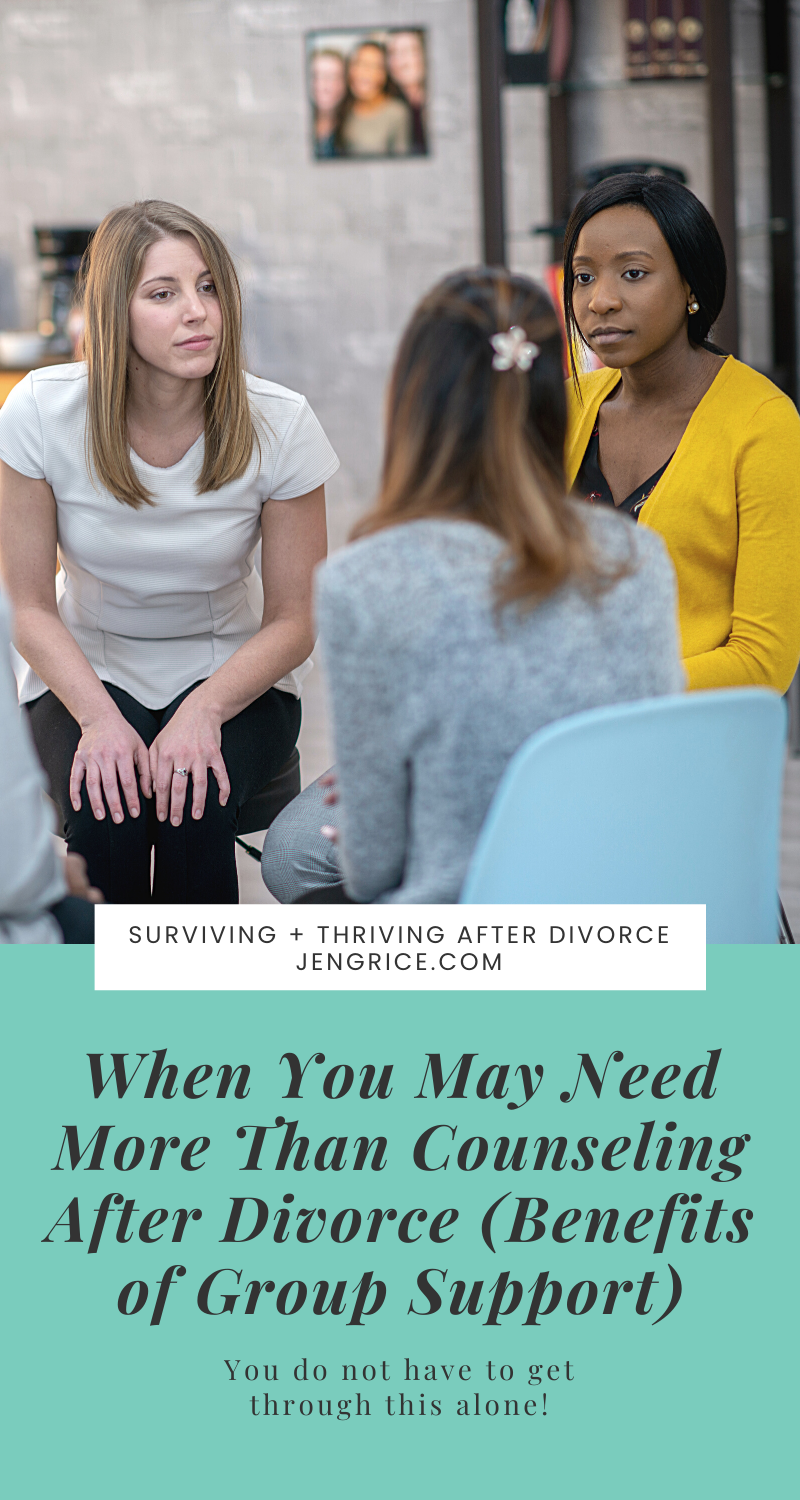Individual counseling can be a powerful healing tool to process through healing after abuse, adultery, and a divorce. In most instances, divorced women gain life-changing feedback, suggestions about how to move forward, knowledge about healthy boundaries, and a new perspective that they may not have ever thought of.
But sadly, for many divorcing women, counseling is just not enough! They could emotionally and spiritually need more. Or they could have limited or no insurance at all to get them through.
This could leave women stuck in their emotional healing.

That’s where specialized counseling and/or a divorce support group, either online or in person, can really step up your healing after a divorce.
What can you do when you feel you need more than what you’re receiving in professional counseling?
This is why having boundaries and learning to be assertive is so important to your emotional healing. You could stay passive hoping things will change. You could keep things locked inside trying to please others. Or you could speak up and say this is not working for me and I need something more. Then seek help in finding exactly what you need!
Before my divorce, I started seeing a licensed Christian family counselor that my children could see as well – all separately. He was also a court-approved therapist, meaning he could speak for the children in court if needed. That wasn’t necessary and less than a year after the divorce, I realized I needed something more for my healing. I told him I wanted to switch to a therapist who was also trained in domestic violence – that was exactly what I needed for my healing.
After about a year of meeting with her and working through all of my abusive past, she encouraged me to start a private online group for my female friends (most of which were homeschool moms too) that I knew who were healing from abuse and/or divorce.
The group interaction and healing support helped all of us to grow and move on with life, together. There are definitely benefits to participating in a group for your healing, especially when individualized support is just not enough.
Six benefits of support groups or group therapy after divorce.
1.) You feel less alone. You feel more accepted and supported when you hear someone else is dealing with what you’re dealing with. As you get to know others in a divorce group, you may actually form friendship bonds – because you have a shared life experience.
2.) Multiple points of view and experiences to hear about. Hearing the stories of others may help you to see your marriage experience, divorce, and current life differently – this could be good when trying to understand the abuse you experienced or even better when you wonder if what you experienced was real. Also, hearing you retell your own story, to others, helps you to realize how far you’ve come, even if you still have a ways to go.
3.) You give and gain support. You can receive the support and feedback of others while also giving feedback and helping someone else on their journey to healing. Many people learn better through teaching, so when you share advice about how to handle a certain situation in someone else’s life, you can remind yourself that you need to be doing the very same thing in your own life.
4.) It’s an opportunity to work on your relationship skills. You’re able to practice healthy boundaries with others who are trying to improve their knowledge of boundaries at the same time. Hopefully, it’s a good group to hold each other accountable for how you’re practicing having emotionally healthy relationships and not allowing others to take advantage of you – encouraging higher standards (God’s standards).
5.) Gain real practice in vulnerability and trusting others. For some, a group experience can cause anxiety especially if it’s a group of strangers. It often seems easier to stay home, keep everything locked inside where no one can see your pain, or hurt you again. But learning to trust and be vulnerable with other people takes practice. Finding a safe environment to do so, helps in your emotional healing. It also shows you that not everyone is out to hurt you. There really are good people in this world!
6.) Joining a group can often be much cheaper than individualized support. But it also can be used in addition to your current counseling. With many licensed counselors charging upwards of $200 or more an hour, finding a free or low-cost support or therapy group will save you especially if you have limited or no health insurance coverage for counseling.
Lastly…
I really enjoyed the online groups I was a part of as well as the three times I attended Divorce Care at my local church. The third time I attended, several years ago, I was asked to come to share my knowledge of narcissism and encouragement for the newest group. This was very healing for me to support other people on their journey to healing. It was then I decided to start coaching women.
If you’re looking for a supportive group, be sure to check out the list on the resources page. There are in-person and online groups listed for wherever you are on this journey – still married, in the legal divorce process, and divorced. We also offer some options below as well.

Have you joined a support group, either online or in-person, during or after your divorce? How was it helpful for you and your healing?
May God bless your healing journey,


I am attending personal counseling and started to go to divorce care four weeks ago. It is so helpful being with others who truly understand my pain and grief and fears. Each one is at a different place in the process so they give me hope I will be ok. It is an added help for me am so grateful to have that as I am still early in in this process and at times am still so raw. One woman gave me her number first night and texting her has been vital to me and she is a gift in her support.
I’m so glad Barb that you’re finding the help and healing that you need in various places with different people. Happy to have you here as well. God bless!
I totally agree that support groups are essential to the healing of those of us not only going through divorce, but divorcing a toxic narcissist. I found a therapist that had extensive knowledge in her field and also a advanced degree in Seminary. She was trained in what abuse did to victims and proceeded with a survivor plan of action. I didn’t start Divorce Care until my divorce was final. Until we met as a group, I read a lot of the resource books and those helped me tremendously. A word of caution with DCare or any group: my DCare leader was not a good one, did not respect boundaries, called out people, and put people on the spot continuously…all the things she told us she would never do. I felt such a heaviness in that group, and I left. I tried to go back later and it was OK b/c the leader was taking a break. When she returned, it started again. Be very careful about the people who are leading the group. I went online for support after that. Gradually, I was able to let go of some of these groups as I was not receiving much from them, but I tried to help with what helped me. It is amazing how many women are going through this type of trauma. Many of us do not have abuse of any kind in our backgrounds, but we share a kind and caring empathetic personality, all great strengths unless you meet a toxic individual who will exploit these strengths and flip them on you so that you believe you are weak. Vet your counselors, your therapists, your group leaders – carefully. Trust your gut. Practice boundaries. It is amazing how freeing it is to say, “no, that doesn’t work for me.” Thank you, Jen, for all the varied topics you bring to this forum. I always learn something!
Thank you Becky for sharing that advice! I was going to speak about that in this post but then didn’t think there was enough room for everything that I’d want to say. I agree with you that no matter if we’re seeing a therapist, a coach, talking with one friend or in a group, that we need to use discernment and have boundaries in every situation. I’ve heard from ladies who had a great experience with Divorce Care, some who had a horrible experience, and some in the middle like yourself and I. There was one leader in my group that really wanted to see all marriages restored – when that’s not always wise or possible. I’ve also heard from others that said Divorce Care really pushes that but I think it’s the leaders rather than the program itself. In some rare cases reconciliation happens but not in cases of serial adultery and narcissism. I’m glad you found a great licensed counseling therapist and are practicing using your assertive boundaries. Good job!